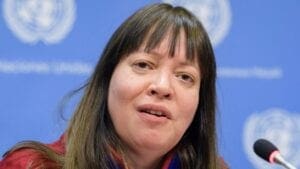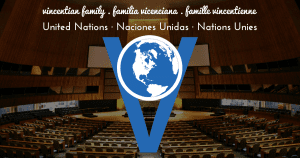As we consider populations most affected by COVID 19, Indigenous Peoples come to mind. This is the time of year that the United Nations normally holds the Permanent Forum on Indigenous Peoples. Because of COVID 19 precautions, multiple events, including the Forum, understandably have been cancelled. But bringing Indigenous concerns to the fore remains vital because Indigenous communities are heavily impacted by the virus and responses to it.
According to the World Bank, there are approximately 370 million Indigenous Peoples worldwide, in over 90 countries.
Many are aware of colonization’s devastating effects upon Indigenous Peoples in the past, particularly related to the importation of deadly epidemics. It is a frightening history. I understand that by 1900 the number of Indigenous Peoples in the Americas declined by more than 80%, and by as much as 98% in some areas, in part the result of diseases such as smallpox, measles, and cholera. Violence, displacement and warfare by colonizers against them added to the decimation of Indigenous Peoples. (Wikipedia).
In our day, history could repeat itself. Coronavirus—another disease from the outside world— is posing a significant threat to Indigenous Peoples.
“If the spread of the virus is not urgently arrested and is allowed to infect African indigenous communities, the virus may decimate our member communities,” said the Indigenous Peoples of Africa Coordinating Committee (IPACC) in an April 9 statement.
In northern Thailand, forest fires and resulting air pollution adds to problems encountered by Indigenous Peoples amid the virus threat. And in Alaska Sambo Dorough, chair of the Inuit Circumpolar Council, an organization that represents 180,000 Inuit across Canada, the United States, Russia and Greenland, said the risk of novel coronavirus, also known as COVID-19, spreading in Inuit communities is exacerbated by persistent infrastructure problems, such as overcrowded housing, a lack of sewage systems, and unsafe drinking water.
 Anne Nuorgam, Chair of the Permanent Forum on Indigenous Issues, also issued a statement which brought to light concerns related to COVID 19’s impact upon Indigenous communities.
Anne Nuorgam, Chair of the Permanent Forum on Indigenous Issues, also issued a statement which brought to light concerns related to COVID 19’s impact upon Indigenous communities.
“Indigenous communities already experience poor access to healthcare, significantly higher rates of communicable and non-communicable diseases, lack of access to essential services, sanitation, and other key preventive measures, such as clean water, soap, disinfectant, etc.,” said Ms. Nuorgam. “Likewise, most nearby local medical facilities, if and when there are any, are often under-equipped and under-staffed. Even when Indigenous peoples are able to access healthcare services, they can face stigma and discrimination.”
A couple years ago, we heard Yanomami People from the Amazon plead at the UN for attention to the impacts of mining, deforestation, pollution, oil drilling, land-grabbing, assaults, and more upon their people. The Yanomami live on the border between Brazil and Venezuela. A 15-year-old boy was the first victim from the Yanomami Community to succumb to COVID 19 on April 9. It is questioned whether illegal miners carried the virus when entering the Yanomami territory.
Many Indigenous Peoples are quite isolated from the outside world. This poses challenges not only in terms of receiving updates about coronavirus, but also reaching distant health facilities properly equipped to treat it. Additional concerns relate to receiving communication in an Indigenous community’s own language so that risks and responses are fully understood.
The call to self-isolate or maintain social distance can be difficult in groups whose cultures include many communal rituals or practices. Fear of coronavirus’ physical effects, grief for family members acquiring it, and its impact upon the entire community can cause trauma. But trauma services are not easily accessible.
In addition to the medical and emotional aspect of coronavirus, Indigenous Peoples face other serious issues related to it. Some lack clean water for protective actions such as hand washing. With requirements to self isolate or adhere to curfews, challenges also arise in accessing food or seeds for planting. Like other global communities affected by coronavirus, lack of work also contributes to an inability among Indigenous Populations to afford food, the cost of which is rising in the midst of the crisis.
As if dealing with the virus wasn’t enough, many Amazonian communities are fighting for survival in other ways. Their lands are severely exploited by miners, loggers, agribusiness, ranchers and more. Wildcat mining and illegal loggers in the Amazon region of Brazil jumped by 51 per cent in the first quarter of 2020, according to Bloomberg. Mining, deforestation, land grabbing, oil spills and pollution are rife in other areas of the 9-nation Amazon region. While Indigenous Communities are self-isolating, rogue miners and loggers are removing resources from their lands. Indigenous Communities must simultaneously try to self-isolate and protect their territories. And invasions from illegal miners and loggers can further expose Indigenous peoples to COVID 19.
Illegal mining and deforestation continue despite the words of Pope Francis in 2018:
“We have to break with the historical paradigm that views Amazonia as an inexhaustible source of supplies for other countries without concern for its inhabitants,” the Pope said.
The UN’s Expert Mechanism on the Rights of Indigenous Persons (EMRIP) had the following to say in its statement: “The spread of COVID -19 has and will continue to exacerbate an already critical situation for many indigenous peoples: a situation where inequalities and discrimination already abound. The rise in national recessions and the real possibility of a world depression are set to aggravate the situation further, bringing fear that many indigenous peoples will die, not only from the virus itself but also from conflicts and violence, linked to the scarcity of resources, especially drinking water and food.”
Let’s not forget Indigenous Peoples at this critical time.








0 Comments